The Iowa Hawkeyes are the athletic teams that represent the University of Iowa, located in Iowa City, Iowa. The Hawkeyes have varsity teams in 22 sports, 8 for men and 14 for women; a 15th women's sport will be added in 2023. The teams participate in Division I of the National Collegiate Athletic Association and are members of the Big Ten Conference. Currently, the school's athletic director is Gary Barta.
Historically, Iowa has been very successful in wrestling, with 37 team Big Ten championships and 24 team national championships. The Hawkeyes have also won national championships in five other sports: men's gymnastics, football, field hockey, rifle and women's track and field.
Men's sports
Baseball
Iowa began playing baseball in 1890, when the Hawkeyes went a combined 2–1 against two teams, Cornell and Vinton. To date, Iowa has won eight Big Ten titles, and in 1972 Iowa earned its way to the CWS at Rosenblatt Stadium in Omaha with a 13–3 Big Ten record, which is still the best Big Ten winning percentage in Iowa baseball history. That record included another school record that still stands, an 11-game Big Ten winning streak. It was Iowa's first outright Big Ten baseball title since 1939, and the last one since, although the Hawkeyes did earn ties for the conference championship in 1974 and 1990.
But that 1972 Iowa team fought its way to Omaha the hard way, losing its first game in the regional tournament, then winning doubleheaders on consecutive days on the campus of Bowling Green University in Ohio. Lose one of those four games, and Iowa goes home. In 1972, only conference champions competed for the eight World Series berths.
The Hawkeyes opened the 1972 CWS against #1-ranked Arizona State, who entered the game with an incredible record of 60 wins and only 4 losses. But Iowa, a huge underdog, outhit the Sun Devils 8–3 only to lose, 2–1. Iowa had the tying run thrown out at the plate in the 9th inning, and left another runner at third as the final out was made. Iowa had also threatened in the 7th with a lead-off double, but could not score. The Hawkeyes then played in the losers' bracket the next day against Temple. But after taking a 6–2 lead into the sixth inning, the Hawkeyes ended up being knocked out of the Series with a 12–8 loss. Arizona State lost the championship game that year to Southern Cal, while Temple finished 3rd. The Hawkeyes finished ranked No. 9 in the nation, still the highest national ranking in the history of Iowa Hawkeye baseball. Future Major Leaguer Jim Sundberg, catcher from Galesburg, Ill., was one of the team leaders. The Hawkeyes featured several Iowans in the starting lineup, including Tom Hurn, Mike Kielkopf, Brad Trickey, along with the top two starting pitchers, Mark Tschopp and Bill Heckroth. Iowa plays its home games at Duane Banks Field, whose namesake is the winningest baseball coach in school history. Rick Heller replaced Jack Dahm as the Hawkeyes' head baseball coach in 2013. In his first season in Iowa City, Heller helped guide the Hawkeyes to a 9–1 start—the program's best start since 1940—a Big Ten tournament berth and conference tournament win. Iowa finished the year with a 30–23 record for just the third 30-win season since 1993. The 30 victories are the most by a first-year coach in Iowa history. but it was on January 18, 1896, that Iowa played the University of Chicago in the first five-on-five college basketball game. The Maroons won that game, 15–12. Six years later, men's basketball became a sanctioned varsity sport under head coach Ed Rule. Rule coached the Hawkeyes in four non-consecutive seasons until 1908, compiling a 37–15 record. Iowa played in the national championship game against San Francisco in 1956, but lost by 12 after taking an early double-digit lead. The Hawkeyes played in a third Final Four in 1980, and have also won the Big Ten tournament thrice since its 1998 inception, in 2001, 2006, and 2022. Iowa's current coach is Fran McCaffery, who coached at Siena College before coming to Iowa in 2010. The Hawkeyes have played their home games in Carver–Hawkeye Arena since 1983; the arena can currently hold up to 15,500 people.
Cross country
The Hawkeyes' men's cross country team won team Big Ten titles in 1961 and 1966 and have also had nine individual Big Ten champions, most recently with Larry Wieczorek in 1967. Wieczorek's time in the 8,000 meter race still stands as the sixth-quickest time in school history. To date, Deacon Jones is Iowa's lone national champion, having won the award in 1957. Both Jones and Wieczorek were all-Americans for the Hawkeyes, along with Kevin Herd, Stetson Steele, and Ted Wheeler.
Football
Football at the University of Iowa dates back as far as November 27, 1872, when the Iowa Academics played a game against the University of Iowa College of Law. However, football was not officially recognized as a varsity sport until November 16, 1889, when the Hawkeyes played against and lost to Grinnell. The next year, Iowa got its first win against Iowa Wesleyan, and since then, the Hawkeyes have won 11 Big Ten championships and have played in 30 post-season bowl games. The Hawkeyes are 17–15–1 in such games, having most recently won against Southern California in the 2019 Holiday Bowl. Iowa won the 2010 Orange Bowl vs Georgia Tech Yellow Jackets 24–14. The Orange Bowl is a BCS bowl game. Iowa's first bowl game was the 1957 Rose Bowl, which ended in a 35–19 win over Oregon State. The Hawkeyes' lone claim to a national championship came after winning the Rose Bowl following the 1958 season, when they were awarded the Grantland Rice trophy by the Football Writers Association of America.
The Hawkeyes' current head coach is Kirk Ferentz. In nineteen seasons under Ferentz, the Hawkeyes have won a BCS bowl, two Big Ten titles and have played in fifteen bowl games. Ferentz is the all time Iowa football wins leader with 151 after surpassing his predecessor, Hayden Fry, during the 2018 football season. Fry, who coached the Hawkeyes for 20 seasons, had 143 wins, three Big Ten titles, and 14 bowl trips in his tenure at Iowa. Fry also led the Hawkeyes to eight-straight bowl games from 1981–1988, the longest such streak in program history. Fry was inducted into the College Football Hall of Fame in 2003. In 2015, the Hawks made it to the Rose Bowl and lost to Stanford.
Since 1929, the Hawkeyes have played their home games in Kinnick Stadium. Renamed in 1972 in honor of Iowa's lone Heisman Trophy winner, Nile Kinnick, Kinnick won the Heisman Award following the conclusion of the 1939 season, but died on June 2, 1943, in the Gulf of Paria during a World War II training flight. His face can still be seen today, on the coins that officials toss at the beginning of all Big Ten games.
Gymnastics
Iowa's men's gymnastics team is credited with winning the first NCAA national championship in school history in 1969. This, in turn, allowed the University of Iowa to become the last of all the Big Ten schools to have won a national championship in an NCAA-sponsored sport. The Hawkeyes have also won seven Big Ten team titles, the last coming in 1998. On the individual level, 12 Hawkeyes have won national championships. Michael Reavis is Iowa's most-recent national champion, having won on vault in 2005.
Swimming and diving
Men's swimming became a sanctioned varsity sport at the University of Iowa in 1917, with David Armbruster as the team's coach. Coaching from 1917–1958, Armbruster led the Hawkeyes to one Big Ten championship, in 1936. He was followed by Robert Allen, who coached the Hawkeyes until 1975. Under Allen, Iowa's best finish in the Big Ten was fifth, on two occasions. Glenn Patton was next in the line of coaches, and during his tenure, the Hawkeyes won two Big Ten championships and finished as high as eighth on the national level. Currently, Marc Long is Iowa's men's and women's swimming coach.
On 19 occasions has a men's swimmer at Iowa won an individual national championship. Ray Walters was the Hawkeyes' first national champion, having won the 50 meter freestyle in 1936. Nine of Iowa's national championships in men's swimming, however, are credited to Artur Wojdat, who competed at the collegiate level from 1989–1992. Wojdat was an 18-time all-American, a 10-time Big Ten champion, and a four-time national champion in the 500 yard freestyle event. Wojdat also won the bronze medal in the 400 meter freestyle at the 1988 Summer Olympics in Seoul, South Korea. Receiving NCAA Swimmer of the Year in 2010 & 2011 while on the University of Florida swim team, Olympian Conor Dwyer swam with the Hawkeyes swim team on scholarship for his first two collegiate seasons: the Hawkeyes were the only university to offer Dwyer a scholarship after high school.
Tennis
Men's tennis became a varsity sport at Iowa in 1939, and from that time to the present, the Hawkeyes have won the Big Ten championship once, in 1958. That year, the Hawkeyes recorded a 10–1 team record and finished third at the national level. In 1998, Tyler Cleveland won the Big Ten Freshman of the Year Award. He later won the Big Ten Player of the Year Award twice, in 2000 and 2001. Cleveland and 14 other men's tennis players have named to an all-Big Ten team; Stuart Waters is the most-recent player to have accomplished this, doing so in 2002 and 2003. The team is currently coached by Ross Wilson who is in his 7th year with the program.
Track
In indoor track, the Hawkeyes have won three team Big Ten titles, the last coming in 1963. On the individual level, Iowa has had 64 Big Ten championships. Nine-time Big Ten champion Bashir Yamini won three of his Big Ten titles in indoor competitions. Named the 1996 Big Ten Indoor Freshman of the Year, Yamini won the indoor long jump every year from 1997 through 1999. 10 Iowa relays have also been named Big Ten champions, most-recently in 1989.
In outdoor track competition, Iowa has won team Big Ten titles in 1963, 1967, 2011, 2019, and 2021. Their …
Eye-catching new design Iowa Hawkeyes clothing will be the perfect gift for Iowa Hawkeyes fans. Clothing on printed with unique and fancy designs, limited number of products.

Iowa Hawkeyes 3D Jersey
$40.95 – $41.95
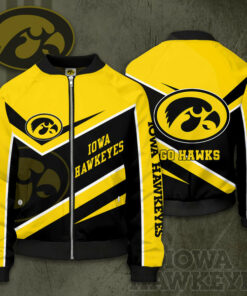
Iowa Hawkeyes Bomber Jacket 3D
$59.95 – $59.98

Iowa Hawkeyes Sneaker
$85.95 – $85.98
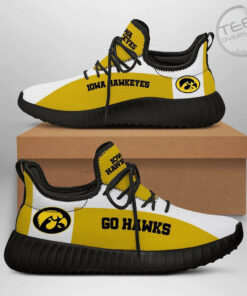
Iowa Hawkeyes Custom Sneakers
$85.95 – $85.98

Iowa Hawkeyes shoes
$89.95 – $89.98

Iowa Hawkeyes 3D Polo
$41.95 – $41.98
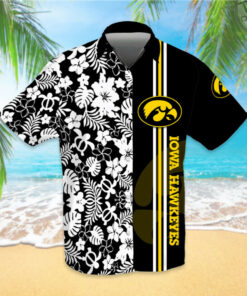
Iowa Hawkeyes 3D Hawaiian Shirt, Hawaiian Shorts
$42.95 – $43.95

Iowa Hawkeyes Sweatpant 3D
$45.95 – $45.98

Iowa Hawkeyes Hollow Tank Top & Leggings & Bra Sports
$75.95 – $75.98
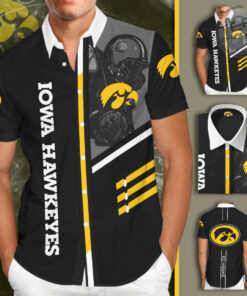
Iowa Hawkeyes Short Sleeve Dress Shirt 3D
$35.95 – $35.98
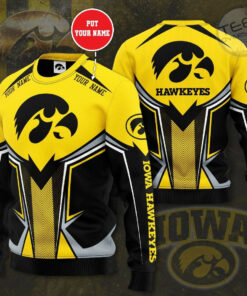
Iowa Hawkeyes Sweatshirt 3D
$41.95 – $41.98
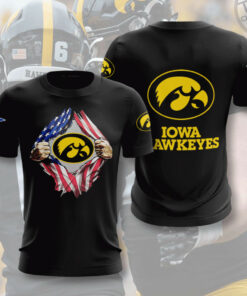
Iowa Hawkeyes T-shirt 3D
$29.95 – $29.98
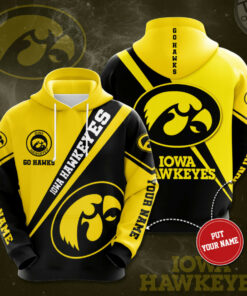
The +10 Best Iowa Hawkeyes Hoodie 3D
$45.95 – $45.98
Historically, Iowa has been very successful in wrestling, with 37 team Big Ten championships and 24 team national championships. The Hawkeyes have also won national championships in five other sports: men's gymnastics, football, field hockey, rifle and women's track and field.
Men's sports
Baseball
Iowa began playing baseball in 1890, when the Hawkeyes went a combined 2–1 against two teams, Cornell and Vinton. To date, Iowa has won eight Big Ten titles, and in 1972 Iowa earned its way to the CWS at Rosenblatt Stadium in Omaha with a 13–3 Big Ten record, which is still the best Big Ten winning percentage in Iowa baseball history. That record included another school record that still stands, an 11-game Big Ten winning streak. It was Iowa's first outright Big Ten baseball title since 1939, and the last one since, although the Hawkeyes did earn ties for the conference championship in 1974 and 1990.
But that 1972 Iowa team fought its way to Omaha the hard way, losing its first game in the regional tournament, then winning doubleheaders on consecutive days on the campus of Bowling Green University in Ohio. Lose one of those four games, and Iowa goes home. In 1972, only conference champions competed for the eight World Series berths.
The Hawkeyes opened the 1972 CWS against #1-ranked Arizona State, who entered the game with an incredible record of 60 wins and only 4 losses. But Iowa, a huge underdog, outhit the Sun Devils 8–3 only to lose, 2–1. Iowa had the tying run thrown out at the plate in the 9th inning, and left another runner at third as the final out was made. Iowa had also threatened in the 7th with a lead-off double, but could not score. The Hawkeyes then played in the losers' bracket the next day against Temple. But after taking a 6–2 lead into the sixth inning, the Hawkeyes ended up being knocked out of the Series with a 12–8 loss. Arizona State lost the championship game that year to Southern Cal, while Temple finished 3rd. The Hawkeyes finished ranked No. 9 in the nation, still the highest national ranking in the history of Iowa Hawkeye baseball. Future Major Leaguer Jim Sundberg, catcher from Galesburg, Ill., was one of the team leaders. The Hawkeyes featured several Iowans in the starting lineup, including Tom Hurn, Mike Kielkopf, Brad Trickey, along with the top two starting pitchers, Mark Tschopp and Bill Heckroth. Iowa plays its home games at Duane Banks Field, whose namesake is the winningest baseball coach in school history. Rick Heller replaced Jack Dahm as the Hawkeyes' head baseball coach in 2013. In his first season in Iowa City, Heller helped guide the Hawkeyes to a 9–1 start—the program's best start since 1940—a Big Ten tournament berth and conference tournament win. Iowa finished the year with a 30–23 record for just the third 30-win season since 1993. The 30 victories are the most by a first-year coach in Iowa history. but it was on January 18, 1896, that Iowa played the University of Chicago in the first five-on-five college basketball game. The Maroons won that game, 15–12. Six years later, men's basketball became a sanctioned varsity sport under head coach Ed Rule. Rule coached the Hawkeyes in four non-consecutive seasons until 1908, compiling a 37–15 record. Iowa played in the national championship game against San Francisco in 1956, but lost by 12 after taking an early double-digit lead. The Hawkeyes played in a third Final Four in 1980, and have also won the Big Ten tournament thrice since its 1998 inception, in 2001, 2006, and 2022. Iowa's current coach is Fran McCaffery, who coached at Siena College before coming to Iowa in 2010. The Hawkeyes have played their home games in Carver–Hawkeye Arena since 1983; the arena can currently hold up to 15,500 people.
Cross country
The Hawkeyes' men's cross country team won team Big Ten titles in 1961 and 1966 and have also had nine individual Big Ten champions, most recently with Larry Wieczorek in 1967. Wieczorek's time in the 8,000 meter race still stands as the sixth-quickest time in school history. To date, Deacon Jones is Iowa's lone national champion, having won the award in 1957. Both Jones and Wieczorek were all-Americans for the Hawkeyes, along with Kevin Herd, Stetson Steele, and Ted Wheeler.
Football
Football at the University of Iowa dates back as far as November 27, 1872, when the Iowa Academics played a game against the University of Iowa College of Law. However, football was not officially recognized as a varsity sport until November 16, 1889, when the Hawkeyes played against and lost to Grinnell. The next year, Iowa got its first win against Iowa Wesleyan, and since then, the Hawkeyes have won 11 Big Ten championships and have played in 30 post-season bowl games. The Hawkeyes are 17–15–1 in such games, having most recently won against Southern California in the 2019 Holiday Bowl. Iowa won the 2010 Orange Bowl vs Georgia Tech Yellow Jackets 24–14. The Orange Bowl is a BCS bowl game. Iowa's first bowl game was the 1957 Rose Bowl, which ended in a 35–19 win over Oregon State. The Hawkeyes' lone claim to a national championship came after winning the Rose Bowl following the 1958 season, when they were awarded the Grantland Rice trophy by the Football Writers Association of America.
The Hawkeyes' current head coach is Kirk Ferentz. In nineteen seasons under Ferentz, the Hawkeyes have won a BCS bowl, two Big Ten titles and have played in fifteen bowl games. Ferentz is the all time Iowa football wins leader with 151 after surpassing his predecessor, Hayden Fry, during the 2018 football season. Fry, who coached the Hawkeyes for 20 seasons, had 143 wins, three Big Ten titles, and 14 bowl trips in his tenure at Iowa. Fry also led the Hawkeyes to eight-straight bowl games from 1981–1988, the longest such streak in program history. Fry was inducted into the College Football Hall of Fame in 2003. In 2015, the Hawks made it to the Rose Bowl and lost to Stanford.
Since 1929, the Hawkeyes have played their home games in Kinnick Stadium. Renamed in 1972 in honor of Iowa's lone Heisman Trophy winner, Nile Kinnick, Kinnick won the Heisman Award following the conclusion of the 1939 season, but died on June 2, 1943, in the Gulf of Paria during a World War II training flight. His face can still be seen today, on the coins that officials toss at the beginning of all Big Ten games.
Gymnastics
Iowa's men's gymnastics team is credited with winning the first NCAA national championship in school history in 1969. This, in turn, allowed the University of Iowa to become the last of all the Big Ten schools to have won a national championship in an NCAA-sponsored sport. The Hawkeyes have also won seven Big Ten team titles, the last coming in 1998. On the individual level, 12 Hawkeyes have won national championships. Michael Reavis is Iowa's most-recent national champion, having won on vault in 2005.
Swimming and diving
Men's swimming became a sanctioned varsity sport at the University of Iowa in 1917, with David Armbruster as the team's coach. Coaching from 1917–1958, Armbruster led the Hawkeyes to one Big Ten championship, in 1936. He was followed by Robert Allen, who coached the Hawkeyes until 1975. Under Allen, Iowa's best finish in the Big Ten was fifth, on two occasions. Glenn Patton was next in the line of coaches, and during his tenure, the Hawkeyes won two Big Ten championships and finished as high as eighth on the national level. Currently, Marc Long is Iowa's men's and women's swimming coach.
On 19 occasions has a men's swimmer at Iowa won an individual national championship. Ray Walters was the Hawkeyes' first national champion, having won the 50 meter freestyle in 1936. Nine of Iowa's national championships in men's swimming, however, are credited to Artur Wojdat, who competed at the collegiate level from 1989–1992. Wojdat was an 18-time all-American, a 10-time Big Ten champion, and a four-time national champion in the 500 yard freestyle event. Wojdat also won the bronze medal in the 400 meter freestyle at the 1988 Summer Olympics in Seoul, South Korea. Receiving NCAA Swimmer of the Year in 2010 & 2011 while on the University of Florida swim team, Olympian Conor Dwyer swam with the Hawkeyes swim team on scholarship for his first two collegiate seasons: the Hawkeyes were the only university to offer Dwyer a scholarship after high school.
Tennis
Men's tennis became a varsity sport at Iowa in 1939, and from that time to the present, the Hawkeyes have won the Big Ten championship once, in 1958. That year, the Hawkeyes recorded a 10–1 team record and finished third at the national level. In 1998, Tyler Cleveland won the Big Ten Freshman of the Year Award. He later won the Big Ten Player of the Year Award twice, in 2000 and 2001. Cleveland and 14 other men's tennis players have named to an all-Big Ten team; Stuart Waters is the most-recent player to have accomplished this, doing so in 2002 and 2003. The team is currently coached by Ross Wilson who is in his 7th year with the program.
Track
In indoor track, the Hawkeyes have won three team Big Ten titles, the last coming in 1963. On the individual level, Iowa has had 64 Big Ten championships. Nine-time Big Ten champion Bashir Yamini won three of his Big Ten titles in indoor competitions. Named the 1996 Big Ten Indoor Freshman of the Year, Yamini won the indoor long jump every year from 1997 through 1999. 10 Iowa relays have also been named Big Ten champions, most-recently in 1989.
In outdoor track competition, Iowa has won team Big Ten titles in 1963, 1967, 2011, 2019, and 2021. Their …
Eye-catching new design Iowa Hawkeyes clothing will be the perfect gift for Iowa Hawkeyes fans. Clothing on printed with unique and fancy designs, limited number of products.

Iowa Hawkeyes 3D Jersey
$40.95 – $41.95

Iowa Hawkeyes Bomber Jacket 3D
$59.95 – $59.98

Iowa Hawkeyes Sneaker
$85.95 – $85.98

Iowa Hawkeyes Custom Sneakers
$85.95 – $85.98

Iowa Hawkeyes shoes
$89.95 – $89.98

Iowa Hawkeyes 3D Polo
$41.95 – $41.98

Iowa Hawkeyes 3D Hawaiian Shirt, Hawaiian Shorts
$42.95 – $43.95

Iowa Hawkeyes Sweatpant 3D
$45.95 – $45.98

Iowa Hawkeyes Hollow Tank Top & Leggings & Bra Sports
$75.95 – $75.98

Iowa Hawkeyes Short Sleeve Dress Shirt 3D
$35.95 – $35.98

Iowa Hawkeyes Sweatshirt 3D
$41.95 – $41.98

Iowa Hawkeyes T-shirt 3D
$29.95 – $29.98

The +10 Best Iowa Hawkeyes Hoodie 3D
$45.95 – $45.98
Comments
Post a Comment